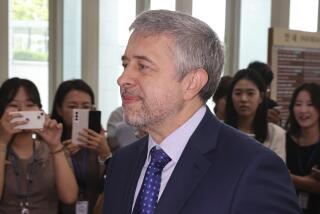7 South Asian Nations Vow Joint Action on Terrorists
- Share via
KATMANDU, Nepal — The leaders of seven South Asian countries have pledged to take joint action against ethnic terrorist groups.
The move came Wednesday at a summit meeting of the South Asian Assn. for Regional Cooperation, which was organized three years ago. The members are India, Pakistan, Bangladesh, Sri Lanka, Bhutan, Maldives and Nepal.
Afghanistan has applied to join the group, and India supports the application, arguing that Afghanistan is already a member of the United Nations and the Nonaligned Movement. But Pakistan contends that no action should be taken on the application until Soviet troops are withdrawn from Afghanistan.
“Let the Russians go first, and then we will see,” a Pakistani official said.
Extradition, Speedy Trial
The convention on countering terrorists was the centerpiece of the meeting. It calls for the extradition of terrorists within the region, and it must be ratified by all the national legislatures before it can take effect.
It would allow signatory countries to obtain the extradition of those they believe to be involved in terrorist acts in another country. And it calls for speedy trial in cases where there is no extradition.
Patterned after European agreements, the convention contains many loopholes. For one thing, a country may choose not to comply with a request it considers trivial.
Yet it has great symbolic value in South Asia, where illicit cross-border activity has been one of the main causes of distrust. This situation has limited trade and increased military spending in countries that can ill afford it.
The convention was signed against a backdrop of Sikh separatists terrorizing the Punjab region in India, Buddhist Chakma rebels fighting government troops in the Chittagong region of Bangladesh and Tamil guerrillas making a desperate stand in Sri Lanka.
India contends that neighboring Pakistan harbors and trains Sikh terrorists. Bangladesh insists that India is behind the Chakma rebellion. Until recently, Sri Lanka complained that India was allowing Tamil separatists to use Indian territory as the staging ground for guerrilla activities in Sri Lanka.
Dozens of similar situations, involving such diverse ethnic groups as Pushtuns, Sindhis and Baluchis in Pakistan, Kashmiris in India and Gurkhas in Nepal, plague international relations in the region.
The two previous meetings of the regional organization, in Bangladesh and India, steered clear of controversy by focusing on such relatively minor matters as travel restrictions and international communications in the region. Since then, the South Asia association has managed to bring about some improvements in those areas.
“The really difficult issues are only now beginning to be talked about,” an Indian official said.
At one point, the convention seemed to be jeopardized by what Indian officials perceived to be a Pakistan-led effort to gang up on them. India is the largest and most powerful member of the group and is often accused of interfering in the affairs of its neighbors. The convention was saved, Indian sources said, by the intervention of Prime Minister Rajiv Gandhi.
Nonetheless, the meeting here was the most contentious since the group was formed.
Confrontation and Crises
Tiny Nepal attempted to put on the best possible face by bedecking Katmandu with flowers and treating the occasion as the greatest thing since the coronation of King Birendra in 1972.
But the past year has been a time of confrontation and crises for the region. Two months ago, Pakistani and Indian troops skirmished on the disputed Siachin glacier of Kashmir. And about 20,000 Indian troops have been trying to control Tamil guerrillas in Sri Lanka.
The Indian troops were invited into Sri Lanka under an agreement signed by Gandhi and President Junius R. Jayewardene of Sri Lanka. But the intervention has done nothing to soothe the concerns of the region’s smaller countries. There is a feeling that the Sri Lanka incident could give India a pretext for becoming something of a regional policeman.
“Remember,” a Nepal official said, “former Afghanistan leader Babrak Karmal always said the Russians were ‘invited’ into his country.”
All the members of the regional group, with varying degrees of enthusiasm, had endorsed the agreement that led to the dispatch of Indian troops to Sri Lanka. But Bangladesh’s President Hussain Mohammed Ershad said in an interview before the meeting, “On principle, we do not approve of the presence of foreign troops in another country without the approval of the United Nations.”
Even Nepal’s shy King Birendra, who shuns controversy, offered a mild warning: “Nepal is firmly opposed to the idea of the Balkanization of states, and she has consistently opposed all forms of occupation of one country by another.”
Of all the South Asian leaders, the man who appeared to be most content with India’s role was Jayewardene of Sri Lanka.
“In our view,” he said, “the peace agreement, apart from making it possible to solve Sri Lanka’s separatist problem, has also to be regarded as a contribution to the stability of our region. It is an agreement of friendship, not enmity; of peace, not war; of life, not death.”
More to Read
Sign up for Essential California
The most important California stories and recommendations in your inbox every morning.
You may occasionally receive promotional content from the Los Angeles Times.













